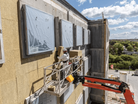How Insulation and Cladding Affects Modern Construction

As the construction industry evolves, insulation and cladding have become pivotal in enhancing energy efficiency, safety and aesthetics, causing major companies to lead the charge with innovative solutions. Yet challenges persist.
Cladding, a protective layer added to the exterior of buildings, enhances thermal insulation, provides weather resistance and improves the aesthetic appeal of structures.
The push for energy efficiency, innovation and solutions that meet stringent requirements without compromising performance in buildings continues to drive demand. Yet questions about material safety continue.
As urban development accelerates globally, the decisions made by this sector will shape the skylines and energy footprints of cities for decades to come.
The role of major construction companies
Leading construction firms and material manufacturers are driving innovation in the insulation and cladding sector.
Companies like Sika Group, a specialty chemicals firm, and Rockwool, a prominent stone-wool manufacturer, are developing advanced external wall insulation systems that improve energy efficiency, reduce utility costs and enhance building durability.
Sika's Sikatherm solutions offer comprehensive exterior thermal insulation composite systems for new constructions and renovations.
Meanwhile, Rockwool specialises in cladded façade insulation systems using stone wool, which is created by combining molten rock and minerals with steel slag into a product that offers sound absorption and fire resistance properties.
Kingspan Group, a global leader in high-performance insulation and building envelope solutions, focuses on innovation and sustainability. Offering products like QuadCore 2.0 insulated panels and AlphaCore Class A insulation boards.
The company’s Planet Passionate programme also aims to reduce environmental impact through renewable energy use, upcycling, and advanced digital technologies.
These companies are responding to key industry drivers: stricter safety regulations, demands for energy efficiency, technological advancements, and market growth. Their innovations aim to prevent energy loss, enhance fire protection, and reduce external noise, catering to both residential and commercial sectors.
Challenges in insulation and cladding
Despite these advancements, the insulation and cladding industry still faces several challenges. One significant issue is compliance with stringent building codes and regulations, particularly concerning fire resistance.
Ensuring compliance while maintaining cost-effectiveness and performance is a delicate balance that companies must navigate.
Another challenge is the retrofitting of existing buildings. Many older structures require upgrades to meet modern energy efficiency standards.
Retrofitting can be complex and costly, often necessitating innovative solutions that minimise disruption to occupants.
Additionally, the industry must address the environmental impact of insulation materials, striving for sustainable and recyclable options.
Tackling challenges with innovation
To overcome these challenges, companies are investing heavily in research and development.
The global cladding market, valued at US$237.70bn in 2023, is expected to grow at a compound annual growth rate (CAGR) of 7.3% from 2024 to 2030, driven by technological advancements and increasing demand for energy-efficient solutions.
Innovations such as lightweight prefabricated cladding systems and advanced digital design tools are making installations easier and more precise.
Fibre cement cladding, for example, is weatherproof and can withstand extreme weather, making it a preferred choice for many construction projects.
Aluminium cladding, known for its lightweight and recyclable properties, is also widely used for its thermal and sound insulation benefits.
The growth trajectory
The insulation and cladding industry is undoubtedly on a growth trajectory, as the market is experiencing significant growth due to several key factors:
- Increasing focus on energy efficiency in buildings
- Stringent government regulations promoting sustainable construction
- Rising global construction activities, particularly in developing nations
- Technological advancements in materials and installation techniques
- Growing awareness of environmental issues and the need for energy conservation
- Demand for retrofitting existing structures to meet modern standards
The European Green Deal and the Renovation Wave Strategy are examples of initiatives aimed at reducing carbon footprints and improving building performance.
Moreover, urban regeneration projects and the need to retrofit existing buildings are contributing to market growth, as cladding provides a practical solution for transforming old structures into modern, energy-efficient buildings, aligning with global sustainability goals.
Bianca Wong, Global Head of Sustainability at Kingspan Group, says: “With the majority of Kingspan’s value chain emissions coming from our upstream supply chain, we are working closely with our key supply partners to reduce the carbon intensity of our key raw materials.”
******
Make sure you check out the latest news at Construction Digital, a BizClik brand.
- Trackunit: the Future of Technology & AI for ConstructionTechnology & AI
- Tarmac Sustainability Report: Green Strides for ConstructionSustainability & Green Building
- Urbanisation ‘Driving Concrete and Cement Growth’Built Environment
- PERI Brings Integrated Scaffold Solutions to ConstructionPlanning & Design




